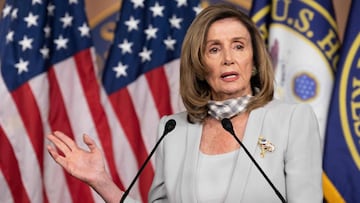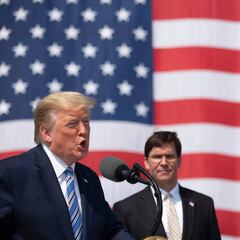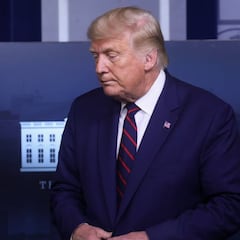Second stimulus package: when could new relief bill be passed?
The Senate and the House are due to return to work in the coming days to attempt to hammer out a fresh coronavirus stimulus package.

After Republicans and Democrats averted a potential government shutdown with an 11th-hour deal on Friday congressional lawmakers will return to Capitol Hill in the coming days to try and hammer out a deal over a new coronavirus stimulus package. The issue has been hotly debated in recent weeks but was shelved in August when the Senate went into recess with no agreement being made over the finer points of the latest economic aid bill and, crucially for millions of Americans struggling due to the financial impact of the Covid-19 crisis, no further news concerning a second round of stimulus check payments.
Both Republicans and Democrats agree on the need for a new tranche of stimulus checks worth $1,200 per individual adult but a series of other issues including funding for states and schools, unemployment benefits and above all the financial outlay of the proposed stimulus package have so far stunted negotiations. The Democrat-controlled House of Representatives passed the $3.4 trillion HEROES Act in May but that proposal fell flat on the floor of the Senate, where Republicans hold sway. A counter-proposal worth $1 trillion was unveiled by Republicans in the HEALS Act but House speaker Nancy Pelosi has said that bill falls considerably short of the needs of the American people.
- Second stimulus check: what did Mnuchin say about relief talks?
- Stimulus check payment: what are the IRS alternatives?
- Second stimulus check: what did Mike Pence say?
- Will Trump sign second stimulus check before US elections?
- Stimulus Checks: what has been agreed and what remains to be resolved?
- Second stimulus check: further financial aid "imperative"
A call between Pelosi and White House Chief of Staff Mark Meadows failed to break the impasse but both sides have shown willingness to alter their proposals in order to try and get a package pushed through as quickly as possible. Pelosi said she had offered to drop the Democrats’ overall funding demands to $2.2 trillion while Meadows intimated the Republicans were willing to add $300 billion to their offer, stating that Donald Trump was prepared to sign a $1.3 trillion package into law. However, that proposal does not include any provision for a second round of stimulus checks.
"The agreement reached this week by the Treasury secretary and our negotiation team to have a continuing resolution to continue to fund the government when the fiscal year runs out at the end of this month means that now we can focus just on another [coronavirus] relief bill," US Vice President Mike Pence told CNBC, adding that Trump supports a second round of direct payments to US citizens.
“Nobody wants to give direct payments to American families more than President Donald Trump again,” Pence said, reiterating the Republican party line that “we’re not going to allow Democrats in Congress to use a coronavirus relief bill to bail out poorly run Democratic states.”
When will lawmakers get to work on a stimulus package deal?
It has been 111 days since the House passed the #HeroesAct, and still Republicans in the Senate remain determined to block this plan to help America’s working families. Enough is enough. The Senate must put #FamiliesFirst and finally pass the Heroes Act. pic.twitter.com/VVQgGG4c0w
— Nancy Pelosi (@SpeakerPelosi) September 3, 2020
The Republican-led Senate is due back on Tuesday, while the Democratic-led House of Representatives plans to hold votes on bills starting the following week. The federal fiscal year ends on September 30, by which time the federal budget for the fiscal year 2021 must be finalized.
With congressional elections on 3 November, both chambers have very few days left to finish work as lawmakers plan to campaign in their home states for much of October.
Last week, the nonpartisan Congressional Budget Office said the fiscal 2020 deficit would hit $3.3 trillion, or 16 percent of gross domestic product, fueled by emergency pandemic aid already enacted into law.
More than $3 trillion in coronavirus relief was enacted earlier this year and Republicans are eager to keep the cost to the federal coffers as low as possible in negotiations over a fresh stimulus package.
Many of the Senate's 53 Republicans are on record opposing additional federal coronavirus relief, and most of the others want to pass a far smaller bill than the House's.
Senate Democratic Leader Chuck Schumer has said he opposes a so-called "skinny" coronavirus bill and his party could block one from passing.
Alternatively, lawmakers could tuck coronavirus relief into the must-do government funding bill. Provisions could include extra unemployment benefits to replace the $600-per-week payments that expired in July, measures to prevent evictions or aid for schools or local governments.
But a spokesman for House Speaker Nancy Pelosi told Reuters that Democrats want a "clean" government-funding bill. That usually means a measure without controversial add-ons.
When could stimulus aid package be passed?
The Senate is due to reconvene on 8 September, with the House getting back to work on 14 September. While Senate Republicans are expected to push a slimmed down relief package when they return it is hugely unlikely to find favor in the Democrat-controlled House. Pelosi has stated that she will not permit the US public to be shortchanged in any new deal and the Democrats’ stance is very much that anything less than the $2.2 trillion they have proffered as a compromise will not be accepted.
Assuming then that the buck will stop with the House, the earliest a bill could be passed is 16 September. Trump would then sign it into law the following day and according to Treasury Secretary Steven Mnuchin the first tranche of checks would start being sent out a week later. Mnuchin added that he could get out 50 million direct payments “really quickly.”
Related stories
Roughly the same timeline would apply if Trump signs an executive order to break the impasse. Although the $1.3 trillion package proposed by Republicans does not include provisions for stimulus checks, the president has intimated he could provide funding for a second round of checks from other federal resources without a deal being hammered out by the two sides.
However, Bill Hoagland of the Bipartisan Policy Center has suggested the timeline may be affected by the November presidential elections. “Politically, some of the people in the White House might think it’s a good thing to get a check signed by Donald Trump right before the election,” he said.

